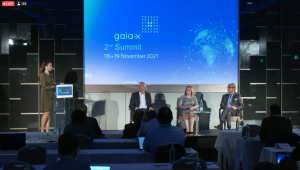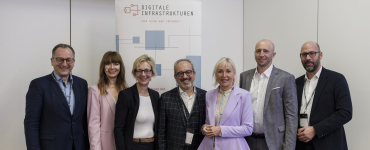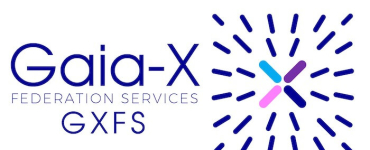Democratising national data marketplaces that make everyone winners, not just individuals – one of the focal points at the Gaia-X Summit 2021 was the difference Gaia-X is making with its foundation of European values and standards. Andreas Weiss (eco) presented the results of his work under the congress motto “Here to deliver”.
Gaia-X needs to prove itself. At a time when some critics are already sounding the death knell for the initiative (in recent articles in the German-language press with titles like “Say goodbye quietly – the silent agony of Gaia-X“ in IT-Business, “Europe’s cloud project threatens to fail“ in Manager Magazin or “When will the ‘bullshit bingo’ finally stop?“ in WirtschaftsWoche), the European Association for Data and Cloud is striking a very different tone at its second summit. In 5 years, Gaia-X will serve the global market. What’s at stake: “Cloud usage in Europe is only 26 per cent,” said Francesco Bonfiglio, CEO at Gaia-X AISBL. What’s missing so far: A trusted and sovereign data infrastructure. “If we bring more companies into the cloud, economies of scale can be achieved, and value can be created across the board,” Bonfiglio said. Values that could add up to an economic potential of around 45 billion Euros in 2023 – thanks to Gaia-X.
Transparency and trust are the solutions
It’s a fact: Gaia-X is not just a pipe dream of a few tech nerds but a real necessity in the interest of society as a whole. While the value of data is growing exponentially, the ability to make sovereign decisions about one’s own data is diminishing. “We lack a voice,” Britanny Kaiser said in the opening remarks. “We don’t know what’s happening with our information, we don’t actually benefit ourselves, but only deliver [data] to a few corporations.” For Kaiser, trust and transparency are non-negotiable building blocks for a digitally more successful, better and fairer world. In 2008, for example, Kaiser’s Barack Obama campaign team developed the first data-driven social media strategy to get non-voters to the polls. Ten years later, as a whistleblower, she exposed Cambridge Analytica’s machinations to manipulate public opinion about Facebook. Two experiences that continue to shape her today. And two events that highlight the difference a data economy based on European values and standards can make.
Sovereignty generates growth and speed
Share data to produce more value cooperatively. Share knowledge to create collaborative innovations. And democratise national information ecosystems in markets that make everyone, not individuals, winners – Gaia-X runs counter to learned principles of competition. “Digital platforms are the digital twins of our reality,” Bonfiglio said. “Whether it’s prosperity, education, or the job market, our fate today depends on taking full advantage of their opportunities.” Why digital sovereignty is the breeding ground for this: “Because it makes us faster,” said Dr Maximillian Ahrens, CTO at T-Systems. This means that certified Gaia-X services are always compliant and legally compliant. “Instead of having to review and evaluate services one by one, Gaia-X does that work for us,” Ahrens said. “And Gaia-X lets us grow!” The federated data ecosystem will be used to create information-based products that open up new opportunities for digital value creation. “Gaia-X is not a community, but rather a movement that defines a new vision of digital sovereignty,” said Prof. Boris Otto, Managing Director of the Fraunhofer Institute for Software and Systems Engineering ISST.
First set of federated services in April 2022
Dr Anne-Sophie Taillandier, Director at IMT, and Andreas Weiss, Head of Digital Business Models at eco, presented how this vision manifests itself in software code. The French-German team is working together to implement the Federation Services of Gaia-X: horizontal services that are available to all users in the ecosystem, for example, to manage identities, catalogue services or meet compliance requirements. “We’re not showing Power Point presentations anymore,” Taillandier pointed out. “But instead, a defined set of services that self-organise to hold data and infrastructure together,” Weiss added. Supported by the ministries of economics of both countries, they are driving the project forward with their teams, tendering work packages and managing the implementation. “In April 2022, the software code for prioritised services will be available,” Taillandier said.
Catena-X entering the market in mid-2022
Time is of the essence. Catena-X has put the automotive industry on the fast track. Twenty-eight companies are already involved in the project, including not only such expected German giants such as BWM, Bosch, Mercedes Benz and Volkswagen, but also international suppliers such as Valeo from France and Stellantis from the Netherlands, as well as companies from outside the sector such as Henkel: “Henkel’s business is heavily intertwined with automotive,” said Oliver Ganser, CEO at Catena-X. The supply and value-added networks, which Catena-X is to map digitally throughout the industry in order to harmonise production processes, conserve resources and manufacture more ecologically, are also interwoven on many levels. “Catena-X makes the circular economy real,” Ganser said. In this way, data should flow between all actors in order to sustainably optimise the life cycle of the automobile – from the first raw material to the last recycled product. Small and medium-sized companies such as LRP Autorecycling will already be on board when Catena-X – fully Gaia-X compliant – will enter the market as early as 2022.
Taking a stand – Gaia-X: Criticism is welcome
It took Jeff Bezos 12 years to morph from an online bookseller to a cloud provider. It took Elon Musk 19 years to launch not only electric cars, but tourists into space. Now Gaia-X is asking Europe for 5 years of trust. In the time span needed to study to postgraduate level, the now 300-plus members of the initiative want to break down data silos, balance private, public and corporate interests, and help the digital single market of an entire continent take off. There is no question that technological issues can be solved jointly – just recently, the Directorate General of the EU Commission for Competition Policy explicitly praised the way those involved in Gaia-X are working together. The decisive factor now is the ability of each individual player to recognise the opportunities that present themselves. What matters: “Show results, communicate transparently and invest in scalability,” said the German Federal Minister for Economic Affairs and Energy, Peter Altmaier. And as Bonfiglio replies to the critics: “At first no one believes you, then you’re criticised, and in the end, you’re accepted. In that sense, we’re making progress on that front too.” More than 5,000 people attended the Gaia-X Summit on 18 and 19 November 2021.



